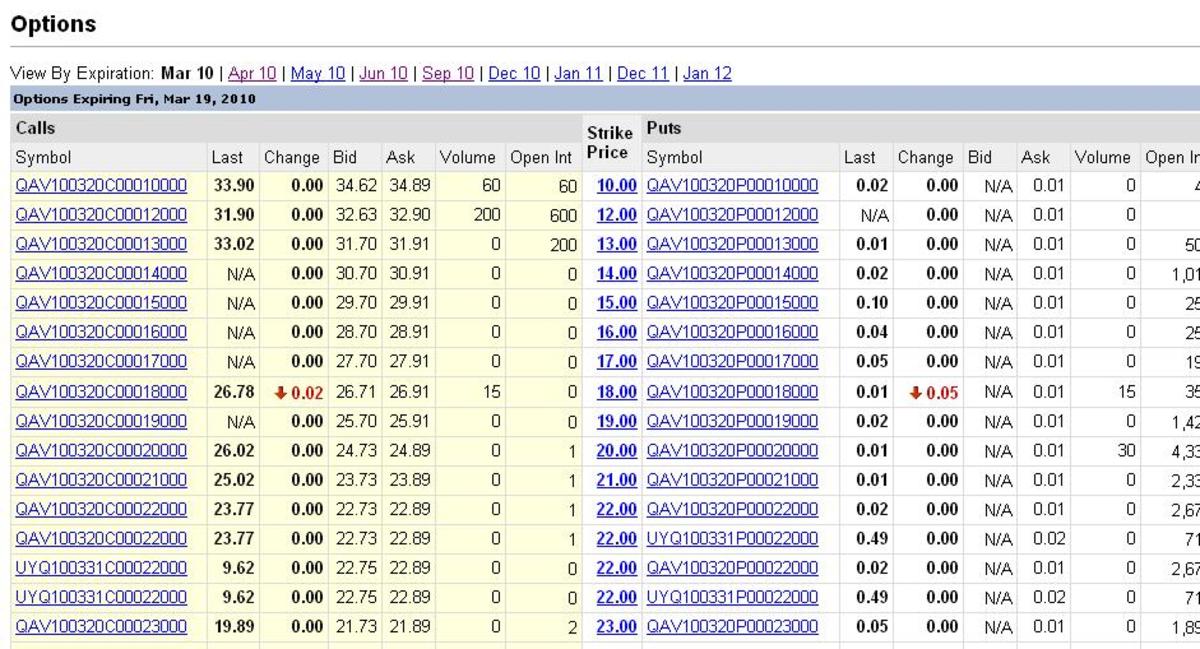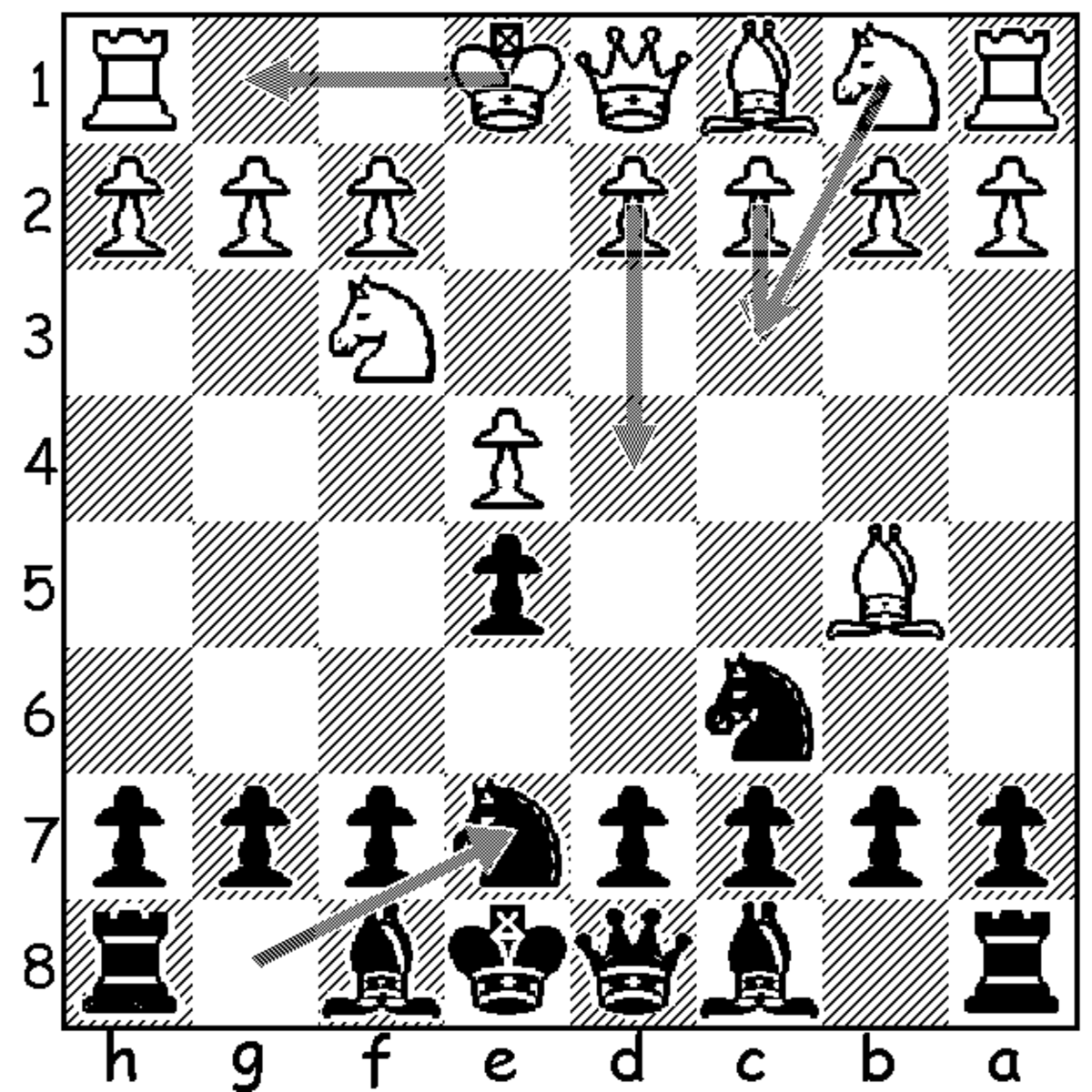What Are Financial Options?
Financial Options Explained

Introduction
I am writing this Hubpage because I was in the middle of another Hubpage which I
felt needed a fair amount of background information on what options were. But
it became too much to include in a single Hubpage so that it made more sense to
describe the background information in its own Hubpage. So here we go with the
background information in What are financial options?
Explanation by way of Example
I am going to start out with an example and then explain the components of the
example further on down in this page.
Other Hubs on Options
- Stock Options Explained
An option is simply the right, for a specified period of time, to buy or sell an item at a guaranteed price. Stock options then, are rights to buy or sell shares of stock at a guaranteed price during the life...
Using Facebook Stock as the Example
At the time of this writing, Facebook (symbol FB) was trading at around $31.
Now what if I told you that I was willing to sell you an agreement that in three
months time you can buy 100 shares of Facebook from me for $32.00 a share no
matter how much higher Facebook increases in price within that three month time
period. Are you interested in this offer?
Your first response to me should be how much will this cost? My response is,
for each share you will pay me $2.60 (so your total cost would be $2.60 x 100
shares). Are you starting to warm up to my offer?
Options on Amazon.com
Call Options
What I have described to you is what is known as a call option. You are buying
the right to the upside of the stock price of Facebook. Suppose you decide to
take me up on my offer. Let's see different outcomes that could happen three months from now.
Outcome 1 - Facebook Stock Exploded
Facebook finally convinces investors that they can monetize the site (by charging a monthly fee to its members) and the stock explodes to $70. How good a position are you in under this scenario? Well, remember what the agreement was, no matter how high Facebook stock is three months from the time of the agreement you would only pay $32.00 per share. So you would buy Facebook from me at $32.00 per share and immediately turn around and sell it in the market for $70. Your profit would be the difference or $3800 per share, right?
Well, it actually is considerably better than that because of the buy at 32 and the instant sell at 70 there was no real cost to you on that transaction. So your only cost is 2.60 per share that you paid as a premium to me. Now I do get to keep that premium but unless I had 100 shares of Facebook when you decided to exercise the agreement, I would have to purchase 100 shares of Facebook in the open market at $70 and sell it to you at $32. So your gain is my loss. From my perspective, that $260 that I received as premium is of little consulation as my
loss is much bigger. I will create another Hubpage describing why anyone would want to take on that risk.
Call Options
Put Options
Outcome 2 - Facebook Price Stayed the Same
Investors are still wary about how the IPO went and aren't quite
ready to jump onboard and buy stock in the company. The stock at the time of
expiration is $32. So what happens to your agreement now? It doesn't really
make sense for you to exercise your option because you would buy the stock from
me at $32 only to turn around and sell it for $32 for a net of zero (not
including transaction costs). Plus, you paid me a premium of $2.60 per share
for a total sum of $260 which I get to keep no matter what. So you would be at
a loss of that amount. The take away is the the stock must be above $32 + $2.60
for you to start making any money. This is your breakeven point.
Outcome 3 - Slightly Higher Than Strike Price
The stock didn't explode but is over $32 at $33.50. Okay, here is
where it gets a bit tricky. As described in scenario 2, this is below your
breakeven so you are sitting on a loss. But there is a rule in the options
market that if the stock is above the strike by seventy-five cents it will
automatically exercise your option. In this scenario your option would be
exercised. It's something to consider as you will now be long Facebook stock
and will have to decide if you want to keep it or sell it.
Your Experience with Financial Options
Have You Ever Traded Options Before?
Outcome 4 - Facebook Stock Declined
Facebook was unable to convince investors that they could make the
whole monetization thing work and more and more investors sold off and the stock
is at $22 at the three month mark. In this case your option expires worthless
and you lose the entire investment of $260.
How Did The Seller Do?
As you can see as the seller I will win in scenario 2 through 4 as you would not
be exercising your option and even in scenario 3 if you were auto exercised, I
would still be sitting on a gain, albeit a small one.
Option Risk
How Risky Do You Feel Options Are?
All About the Lingo of Options
Hopefully this example gives you a good idea of how options work. But there is
some lingo that is necessary to understand before deciding whether you want to
explore the world of optioons further. I will describe the lingo in the context
of the example above.
Terminology

Lingo Necessary To Work With Options
- Underlying - an option is a derivative product and as such derives it's value from some asset - this asset is referred to as the underlying. In the example above the underlying asset is Facebook stock. An underlying asset can be pretty much anything such as a future, a swap, a bond, etc. But to keep it simple we will concentrate on stocks.
- Underlying price - this is the price that is used to determine (or derive) the price of the option. This is readily observable in any website that quotes stock prices.
- Strike price - this is the price that the holder gets to buy the stock for. In the example the $32 would be the strike price. There can (and often is) multiple strike prices that center around the stock's current price (both up and down).
- Expiration date - all options expire. Although I didn't give a date above it was the three month time period after you purchased the agreement from me. Typically for stocks, it is the third Friday (technically Saturday but no one can trade on Saturday) of the month of expiration. So if three months were to be September, than expiration would occur on the third Friday in September.
- Exercise - this is where you contact the seller and tell him or her that you want to move forward with the deal and buy the shares at the strike price from the agreement again, that is the $32 in the example. This is an oversimplification as you would really contact your broker for exercising that option. You never deal with the counter party directly. The exchanges handle everything.
- Premium - that is the amount you pay for the right to buy the stock at a future date (the three months from the agreement in the example) for the strike price ($32 - againg from the example).
Conclusion
Hopefully this Hubpage gave you a good idea about what options are. I will
follow up with a series of pages that will give more detail about the dynamics
as well as why you'd want to trade them (or in some cases avoid them). Also, I
will give some ideas on how options can be used to reduce the risk within your
portfolio.
Two Types of Options
There are two types of option contracts (agreements). The above example and
scenarios all describe an option that is known as a call option. This is because
you are calling shares from the seller.
The second type of option is a bit more difficult for people to grasp and is
known as a put option. This is where you put (sell) shares into the hands of
the seller. In this type of option you would be hoping for the shares to drop
so that you can go out into the market and buy shares at the lower price to
instantaneously sell it to the seller of the put option for a higher price. To
further the Facebook example, suppose you bought a put option from me that had a
strike price of $30. Let's keep the same expiration as three months and for
that right you pay me $2.40 per share for a total of $240. Now at the end of
the three month period Facebook is trading at $22. You would buy 100 shares of
Facebook for $22 and then exercise your option to sell those shares to me at
$30. Your total outlay for this set of transactions is $240 (no transaction
costs are considered here).










